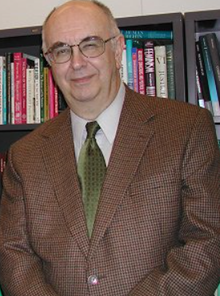James Rachels
This article needs additional citations for verification. (March 2021) |
James Rachels | |
|---|---|
 | |
| Born | James Webster Rachels 30 May 1941 Columbus, Georgia, U.S. |
| Died | 5 September 2003 (aged 62) Birmingham, Alabama, U.S. |
| Alma mater | Mercer University, University of North Carolina at Chapel Hill |
| Era | Contemporary philosophy |
| Region | Western philosophy |
| School | Analytic philosophy |
Main interests | Ethics, bioethics, animal rights |
James Webster Rachels (May 30, 1941 – September 5, 2003) was an American philosopher who specialized in ethics and animal rights.
Biography
Rachels was born in Columbus, Georgia, and graduated from Mercer University in 1962. He received his Ph.D. in 1967 from the University of North Carolina at Chapel Hill,[1] studying under W. D. Falk and E. M. Adams. He taught at the University of Richmond, New York University, the University of Miami, Duke University and the University of Alabama at Birmingham, where he spent the last twenty-six years of his career. He married Carol Williams in 1962, and they had two sons, David and Stuart.
As a teenager, he won a national speech contest that enabled him to appear on American Bandstand and to meet
At the University of Alabama at Birmingham, Rachels started in 1977 as Chair of Philosophy, became Dean of Arts and Humanities from 1978-1983, and then one year as Acting Vice-President for University College.[3] After retiring from administration at UAB, he was named University Professor and in 1992, the second Ireland Scholar.[4]
Over the course of his career, Rachels wrote 6 books and 85 essays, edited 7 books, and gave some 275 professional lectures. He argued for moral vegetarianism and animal rights, affirmative action, euthanasia, and the idea that parents should give as much fundamental moral consideration to another's children as they do to their own. Later in his career, Rachels realized that a lifetime of analysing specific moral issues had led him to adopt the general ethic of utilitarianism, according to which actions are assessed by their effects on both human and nonhuman happiness.[citation needed]
Rachels died from cancer on 5 September 2003, in Birmingham, Alabama.[1]
Works
Rachels' best-known work is
In 1975, Rachels wrote "Active and Passive Euthanasia", which originally appeared in the
Rachels wrote only a few works that were not directly focused on ethics. Created from Animals (1990) made the case that a Darwinian world-view has widespread philosophical implications, including drastic implications for our treatment of nonhuman entities. Can Ethics Provide Answers? (1997) was Rachels's first collection of papers. His second, The Legacy of Socrates, was published posthumously in 2007. Shortly before his death, he wrote Problems from Philosophy (2005), an introduction to philosophy.
Vegetarianism
Rachels authored papers defending
Rachels argued that the primary reason why cruelty to animals is wrong is because tortured animals suffer, just as tortured humans suffer.[8] He held the view that inflicting pain on animals can sometimes be justified but we must have a sufficiently good reason for doing so. The idea to consume meat just because it tastes good does not come close to justifying the cruelty of the meat industry.[8]
Rachels stated that "from a practical standpoint, it makes sense to focus first on the things that cause the most misery".
Bibliography
- with ISBN 978-0-07-338661-4.
- with ISBN 0-231-13844-X.
- (2005). Problems from Philosophy. Boston: McGraw-Hill Higher Education.
- (2004). The Basic Argument for Vegetarianism. In Sapontzis (ed.) Food for Thought: The Debate over Eating Meat. Prometheus Books. pp. 70–80.
- (2004). A Moral Defense of Vegetarianism. In Christina Hoff Sommers, Frederic Tamler Sommers. Vice & Virtue in Everyday Life: Introductory Readings in Ethics. Wadsworth. pp. 591–595.
- (1998). Ethical Theory: Theories About how we Should Live. Oxford University Press. ISBN 978-0-19-875186-1.
- (1997). Can Ethics Provide Answers?: And Other Essays in Moral Philosophy. Rowman & Littlefield Pub Inc. ISBN 0-8476-8347-8.
- (1990). Created From Animals: The Moral implications of Darwinism. Oxford University Press. ISBN 0-19-217775-3.
- (1989). The Right Thing to Do: Basic Readings in Moral Philosophy. Random House. ISBN 0-07-340740-2.
- (1986). The End of Life: Euthanasia and Morality. Oxford University Press. ISBN 0-19-286070-4.
- (1986). The Elements of Moral Philosophy. New York: Random House. ISBN 0-07-803824-3.
See also
References
- ^ S2CID 53255485.
- .
- ^ Ott, Tanya (September 7, 2003). "Remembering James Rachels". WBHM 90.3.
- ^ "Accessed July 26, 2018".[permanent dead link]
- ^ James Rachels. JboBio.com. Accessed April 19, 2012.
- ^ ISBN 978-1-4411-0350-5
- ISBN 978-1-138-32828-0
- ^ a b Mappes, Thomas A; Zembaty, Jane S. (1982). Social Ethics: Morality and Social Policy. McGraw-Hill. p. 389
External links
- James Rachels, selected writings on animal rights
- Text of "Active and Passive Euthanasia"
